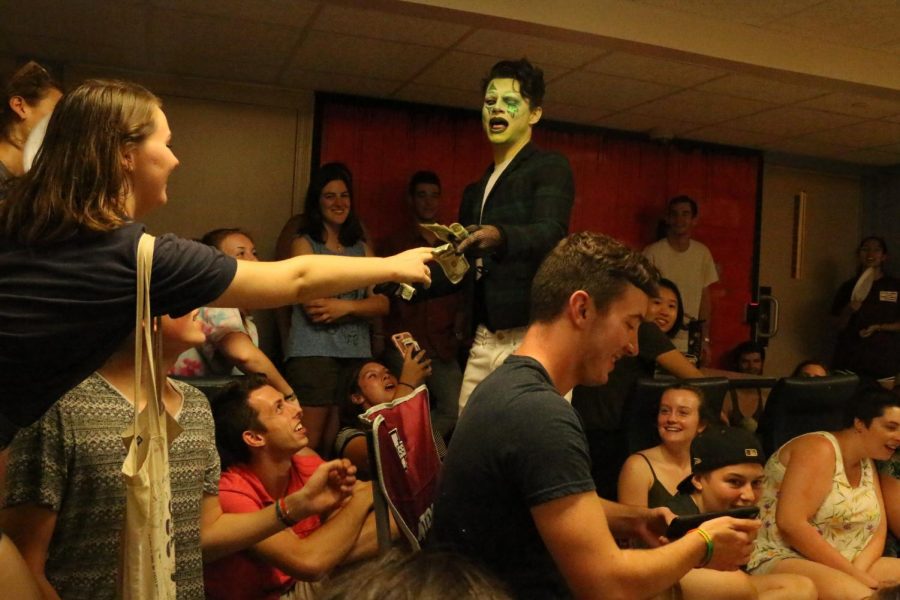Dragging it out: Justin Petrie works to expand drag culture at UMass
Justin Petrie performed in drag as Chemical-X at Greeno Sub Shop in September, to bring more visibility to the drag community at UMass (Jill Webb/Amherst Wire).
AMHERST — Justin Petrie’s first attempt at painting his face was awful.
Petrie, 19 at the time, took a blue Mehron cream stick, a brand of special effects makeup, and slathered it all over his face in preparation for a night out on the Providence, Rhode Island drag scene.
“For some reason, I thought it would be a good reason to go all blue. I went all blue, I looked like a fricken’ smurf,” Petrie said.
Petrie, now 20, is a sophomore communication major at the University of Massachusetts Amherst who is working to expand the culture of drag throughout campus.
For his first attempt at drag makeup, he bought a bunch of buttons from JOANN Fabric and Craft Stores and adhered them with Spirit Gum adhesive. He forgot to set his makeup, which preserves it longer, and by the end of the night, the blue paint was dripping off of his face.
Now, Petrie has mastered the art of drag makeup — and drag itself. “I had a bunch of those friends back home that I always watched do their makeup and I was like ‘I could do that,’” Petrie said.
When he says “back home,” he isn’t referring to his hometown of Tewksbury, Massachusetts, but instead a community that feels more intimate to him: the Providence, Rhode Island drag scene.
“When I say back home, and I’m referring to those friends; I mean me going all out of my way to see all them down there,” Petrie said.
Providence is vastly different from bigger drag scenes like in New York or Chicago — everyone knows each other and it feels very “homey,” according to Petrie.
Petrie got into drag as a result of a second-semester slump. He was homesick, had just gotten out of a long-distance relationship, and as a former cheerleader in high school, he missed performing.
“I was looking for an outlet, almost like a creative outlet. Instead of picking up some kind of hobby — like a normal hobby — I was like well … let’s do this.”
Petrie’s drag name is Chemical-X, and he performs as a bio king; a form of drag where a biological male performs and dresses as a male.
“As we’re finally starting to explore gender more and realize that it’s very fluid and there’s non-binary people and all that stuff, as is drag is changing.”
A typical drag performance, according to Petrie, is “just like a lip-sync.” Petrie says that performers get up on the stage, give their best show, have fun and then people will tip.
“It’s just a fun atmosphere that gets everything off your mind which is why I loved it,” Petrie said.
Each drag performer’s persona doesn’t conform to a standard; it’s more about what they want their performance to represent.
“What my drag stands for is creative, kooky, almost like stupid. I describe it as being so dumb, because yes it’s portrayal of gender to me, just like all drag is, but I also think it’s a walking piece of art,” Petrie said. “Not necessarily it looks amazing, or that it looks the prettiest, but it makes you stop and want to analyze it.”
Since he started performing, Petrie says he has been genuinely happier. “I was so depressed at the time that I was like ‘well, if I could just shift all that sadness and anger into something positive and something creative and something I enjoy doing.’ Then it all worked out.”
Disappointed by the lack of drag culture at the UMass Amherst, Petrie decided to take things into his own hands.
In September 2017, he came up with the idea to put on a drag show at the Greeno Sub Shop, a student-run business that “strive[s] to be an open and inclusive space for all members of the UMass Amherst campus community,” according to its website.
Besides opening the UMass community up to the drag scene, he wanted to use the show as a charitable platform to raise awareness about LGBTQ+ issues on the campus. In particular, the Baker Hall bathrooms.
Baker Hall has a defined residential community, the Spectrum floor, that caters to a gender inclusive demographic. According to a Massachusetts plumbing code, in order to be considered a gender-neutral bathroom, it needs to have a single stall and shower, but the one in Baker had multiple stalls and showers, as most residential hall bathrooms do. The administration, not wanting to break code, turned this into a female-only bathroom, to the dismay of the floor’s residents.
“The fact that it’s something as simple as a piece of metal that just says ‘women’ on it affects a community this much needs to be addressed, I think,” Petrie said.
The show, which took place on Sept. 24, packed the Greeno Sub Shop with approximately 100 people. It featured performances set to the songs of Ariana Grande, Ru Paul and more. It was hosted by Petrie as Chemical-X and four other performers: Jessie Junk, Steyonce, Zane-X and Larissa Montes. The show raised $330 through performance tips to be donated to the Stonewall Center.
Sophomore attendee Madison Trepanier felt the room was full of good energy that night.
“I feel like events like these are really great to have on campus because it brings people like me who have never been to a drag show to an event like this,” Trepanier said. “This is a really big culture, and I think it should be brought to UMass on a bigger stage because it’s what a lot of people are passionate about.”
Junior theater major Ethan Gourlay, a.k.a Jessie Junk knows the importance of performance art.
“It’s important to remember in today’s political climate that drag was invented by trans women of color —because the president, the government and society at large wants to mute their voices, and I, as a white person, need to always be bringing that up,” Gourlay said.
Petrie invited members of the Stonewall Center to speak on behalf of the organization on drag culture during the intermission, one of them being Madeline Stump.
Stump, a Stonewall Center facilitator, wants drag’s future to be less dependent on profiting off identities. “We are hoping that drag can be less invested in the exploitation of black culture, as well as less invested in jokes at the expense of trans folks,” Stump said in an interview.
Petrie hopes drag culture’s growing presence can help open the minds of those averse to it. “They don’t have to love it, or appreciate it as much as we do within the community, but they need to at least have a drive to understand it and validate it as it’s own being, it’s own community.”
Email Jill at [email protected].










